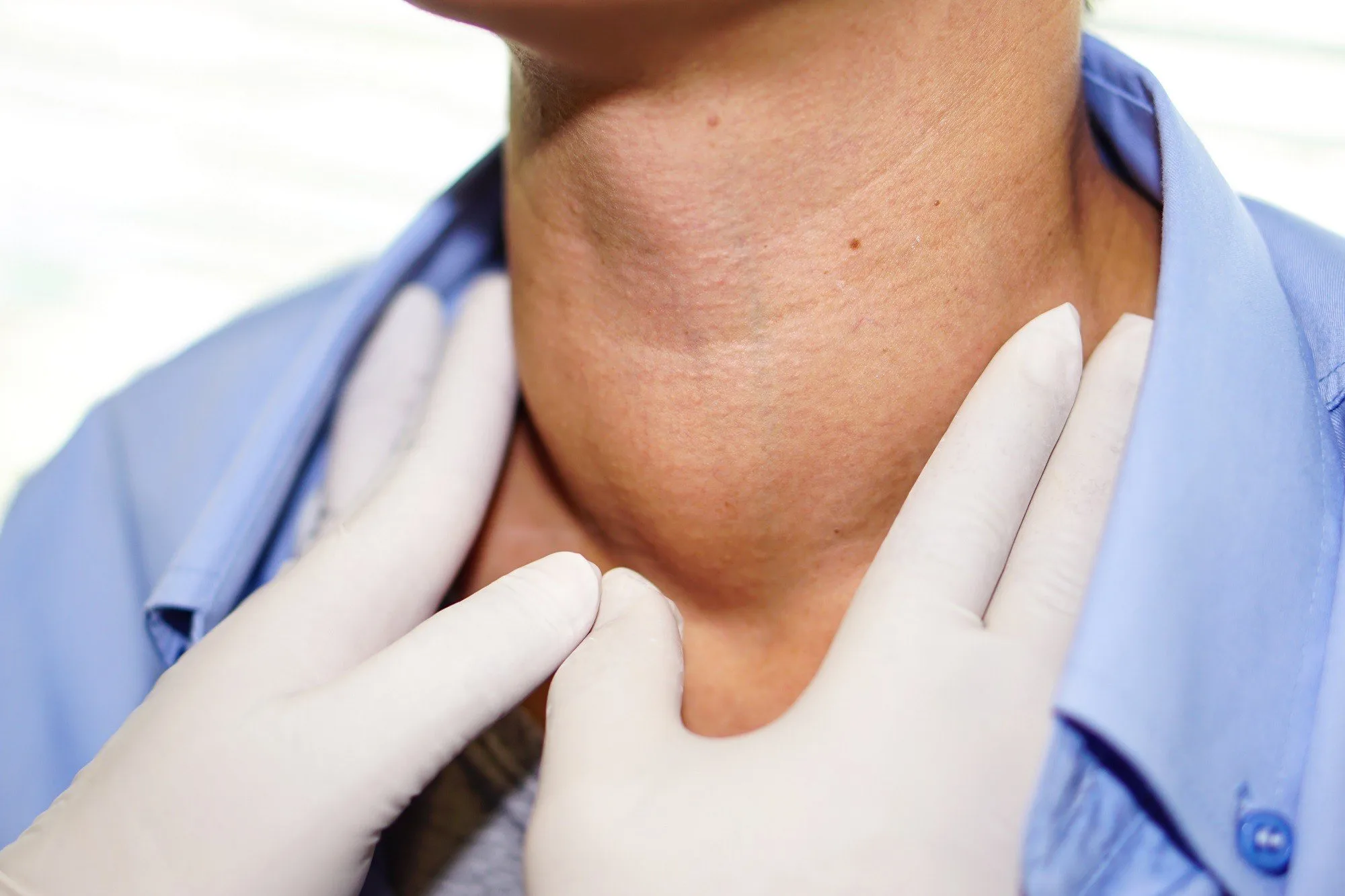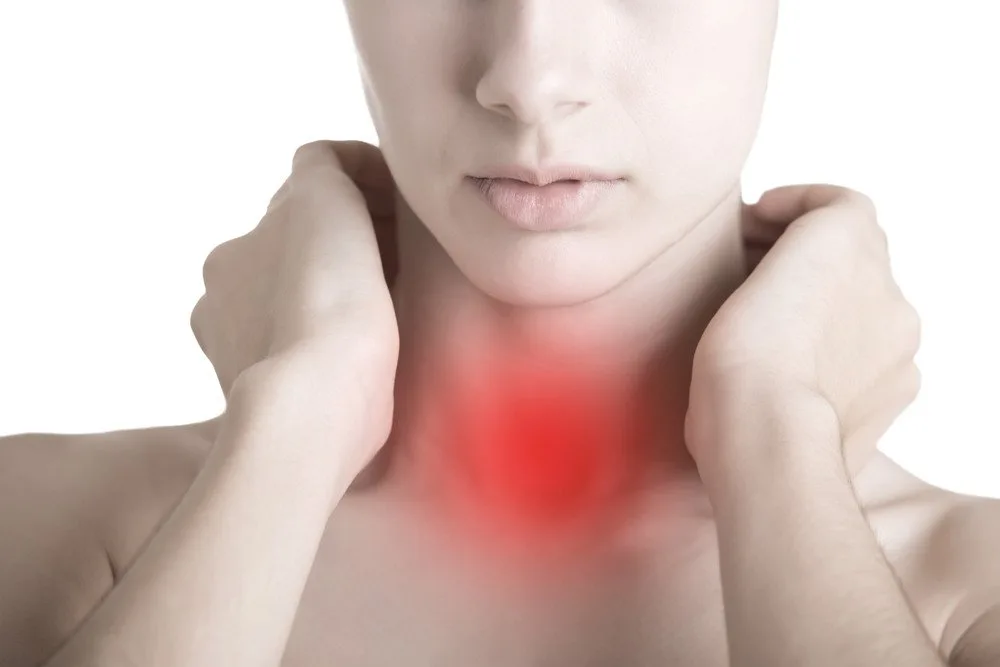As important as the thyroid gland is, it’s quite clear that many of us are unaware of just how vital it is when it comes to the state of our health. With that said, we’ve reached out to specialist Dr. Fathima Docrat, who explains just how important our thyroid health is.
“Basically it is a small gland that sits right here on our air pipe, it’s a butterfly-shaped organ, and it’s important for regulating everything in the body system” explains Dr. Fathima Docrat, a female surgeon whose expertise focuses on thyroidectomy and parathyroidectomy, which is carried out to treat certain thyroid disorders.
“The thyroid plays a major role in the metabolism, growth, and development of many organs in our body. It’s part of the endocrine system, which includes organs that store hormones before secreting them. The hypothalamus and the pituitary gland, which are located in the brain, help control the thyroid gland. The hypothalamus releases hormones that stimulate the pituitary gland to release another hormone which then stimulates the thyroid to release thyroid hormones.”
Dr. Docrat adds that the thyroid is a small gland with a very big job, it has a crucial role in how the body functions. Your skin, brain, heart, kidneys, and liver all depend on the thyroid to function optimally.
What are the main thyroid disorders?
“When we look at thyroid disorders, we divide into hypothyroidism, which is when there are too little hormones being secreted, and hyperthyroidism, which is when there are too many hormones being secreted” explains Dr. Docrat.
Hypothyroidism
This is when the thyroid secretes too little hormone. According to Dr. Docrat, this can be caused by thyroiditis, which refers to the inflammation of the thyroid gland and lowers the number of hormones your thyroid produces. 5-9% of women develop postpartum thyroiditis after childbirth.
“Hashimoto’s disease is quite a common disease. It is an auto-immune disease where the thyroid starts attacking itself, causing it to secrete fewer hormones.”
An iodine deficiency may also increase the risk of hypothyroidism as iodine is used by the thyroid to produce hormones.
Hyperthyroidism
It is often caused by Graves disease, as well as the development of nodules in the thyroid, which soon start secreting too much hormones. Additionally, hyperthyroidism can also be caused by inflammation.
What about thyroid cancer?
“Yes, cancers can be present in the thyroid”, explains Dr. Docrat, “However, they are very rare. In fact, four to six percent of nodules in the thyroid gland are cancerous. Moreover, the good thing about thyroid cancer is that it’s a very slow-growing cancer. Thus, it can be easily managed most of the time.”
What are the symptoms of thyroid disorders?
Patient symptoms depend on whether they have hyper or hypothyroidism.
Hyperthyroidism symptoms include weight loss, intolerance of heat, diarrhea, irritability, palpitations. Hypothyroidism symptoms include: feeling cold, constipation, depression, weight gain, brittle nails, and dry skin.
According to Dr. Docrat, thyroid disorders are quite easy to diagnose.
“When the patient walks in, you already know what you are dealing with” she explains, “The hyperthyroid patients can’t sit still in the chair. They are fidgety, they are anxious. They are irritable. The hyperthyroid patients, on the other hand, are sad, depressed, and slow. It’s quite easy to just see before you even do the blood.”

Who is at risk?
“Thyroid disease actually affects right through the ages. We have from young adults to older adults getting thyroid disease”, says Dr. Docrat, “Obviously those, particularly women, who are above 60 are at a higher risk of developing nodules. They are at a higher risk of developing hypothyroidism because hypothyroidism is when everything starts slowing down – the production of thyroid hormones starts slowing down, therefore they end up with hypothyroidism.”
That said, Dr. Docrat mentions that if they develop a nodule, the nodule can decide whether it’s becoming hypo or hyperthyroid.
Younger patients tend to have hyperthyroidism and cancers are more common in younger patients, especially in males who present with nodules.
Women are up to five times more likely to get hypothyroidism.
Additional risk factors also include:
- People who take certain medications like amiodarone and lithium
- People who have had radiation therapy to the head and neck area
Does genetics play a role?
Yes, genetics plays a role. If you have a family history of thyroid disease you are at risk.
“Thyroid cancers can be passed down, but it depends on which type of cancer. There are four different types of thyroid cancers, with medullary being the most common one that will be passed down,” says Dr. Docrat

Dangers of undetected thyroid disorders
“Having too much hormones is actually more dangerous than having too little hormones”, explains Dr. Dorcat. Individuals with undetected hyperthyroidism can cause your heart to beat faster, and this can result in major cardiac problems.
“These patients can be walking around with pulses of over a hundred – some of them will even be at a hundred and forty. These patients are at risk of going into a thyroid storm. Their bodies are on fire – literally”
In addition to cardiac concerns, undetected thyroid disorders also mean that patients are walking around with nodules not being investigated. This could then mean that there’s cancer that is being missed and this is concerning once you remember that thyroid cancers, when picked up early, usually have a good outcome.

Photo by Adrien King on Unsplash
Undetected hypothyroidism
If it’s not treated, and you get a small infection, such as the flu, you can actually go into a coma – Myxedema coma.
“This is when all your organs basically slow down, your body becomes cold, nothing is functioning. You can develop bradycardia, which is slower than normal heart rate and these are very, very scary situations for your doctors,” explains Dr. Dorcat.
Undetected thyroid nodules

As mentioned, there are four different types. In addition to the medullary, which is passed down, anaplastic thyroid cancer is a thyroid mass that starts as something small but then grows very, very fast. So, if you leave it unattended for even a month, it can grow to such a point where it can disrupt the structures in the neck.
“The thyroid grows on the air-pipe so if it is not treated, and you’ve got nodules developing on the thyroid like a multi-nodular goiter, and it continues to grow over the years and years, eventually it will reach a point where it starts extending into your chest. It will start compressing on vital structures, and you’ll start developing compressive symptoms”.
According to Dr. Docrat, patients experience difficulty swallowing, and find it hard to lie flat on the bed due to the huge mass sitting on their apps. What’s more, their voices change, becoming hoarse.
“This is why it’s always better to pick it up when it’s earlier because the operation is better, it’s easier, and you don’t have the major difficulty of compressed airway.”
Managing a thyroid disorder
If you’re noticing any problems with your thyroid, you will first start off with your general practitioner. From there, you will go to either a physician or endocrine – the endocrinologist’s job will be to figure out what’s going on and decide if surgery is necessary. Dr. Docrat mentions that surgery is not indicated for all thyroid diseases.
Hypothyroidism
“If your diagnosis falls under hypothyroidism, we have to first exclude cancer to make sure there’s no worry of cancer in the thyroid. From there, you get started on medication to replace the lost thyroid hormone, which is Eltroxin. Patients can be on this medication for the rest of their lives and doctors will perform regular blood tests to check the levels of the hormones, then adjust as needed.”

CHESIIRECAT/GETTY IMAGES
Are there any side-effects?
If it’s not managed properly, you can push yourself into hypothyroidism if it’s not taken correctly.
Patients may also experience some joint pain as well as some alterations in the heart rhythm.
“Patients need to follow the instructions, and they also need to make sure that they see the doctor and get a recent blood test. I would say at least every six months, have your blood tests and see your GP.” says Dr. Docrat
Managing hyperthyroidism
According to Dr. Docrat, hyperthyroidism is managed in three different ways.

Photo by Lucija Ros on Unsplash
1. Radioiodine ablation
This is a nuclear medicine scan whereby they give you a tablet, they do a scan, and they actually kill the thyroid in an effort to decrease the hormones.
“When we treat hypothyroidism, we rather have our patients hypothyroid, as opposed to having them have too much hormones ” explains Dr. Docrat, who states that overproduction of hormones places the heart under major strain and the body cannot function.
2. Medication
The drug that is available in South Africa is Carbimazole. Once started on medication, the dose is tailored to lower thyroid levels. Most of the time, the patient will also require medication to control the heart rate.
3. Surgery
This is where they remove the thyroid. Surgery is offered for suspected or conformed cancer, compressive symptoms (difficulty breathing or swallowing, hoarseness), and on the same occasion for cosmetic reasons
“The difficult part about the thyroid, unlike the breast whereby we can do a core biopsy without operating, is that we, unfortunately, cannot do a big biopsy beforehand. Instead, we do a fine needle aspiration, and this can only give us a rough idea of what’s going on in the thyroid. “It’s only when we take out the thyroid and send it to the lab do we know for sure, whether it’s cancer or not cancer” explains Dr. Docrat. That said, it should be noted that in regards to all the suspicious nodules operated on, only around 4.5 to 6% turn out to be cancerous.

Can hyperthyroidism lead to hypothyroidism?
According to Dr. Docrat, for patients who choose surgery to manage their hyperthyroidism, there is a hundred percent chance of them developing hypothyroidism.
The majority of patients treated with radio-iodine ablation over time could become hypothyroids.
For those who choose medication, research has found that over a few years, the thyroid might burn itself out and stop secreting excess hormones, increasing the risk of them developing hypothyroidism in the future.
How can I reduce my risk?
“We always try to do simple things to prevent the disease from coming,” says Dr. Docrat. This can include not smoking as smoking can increase your risk of thyroid disease (1).
Other lifestyle changes include analysing your diet, especially since iodine plays an important role in hormone production from the thyroid gland. According to Dr. Docrat, some areas that have iodine deficiency often have patients that develop a goiter, which is the enlargement of the thyroid gland.
Diet advice

Gayvoronskaya_Yana/Shutterstock
“Our body cannot make iodine if we do not take it in.” That said, Dr. Docrat suggests consuming iodinated salt, as well as dairy products that include cheese, cow’s milk, eggs, ice cream – which she’s sure we would all appreciate. Additionally, it would be best to limit alcohol consumption. Follow a healthy diet, avoid processed foods, try and limit soy intake.
According to The Lucy Rose Clinic, a thyroid specialist Melbourne residents trust when it comes to caring for their thyroid, some people with thyroid conditions, such as Hashimoto’s thyroiditis, may be sensitive to gluten. It’s essential for these individuals to avoid gluten-containing foods such as wheat, barley, and rye.
Smoking
Smoking increases your chances of thyroid disease and Thiocyanate disrupts iodine uptake, which blocks the production of thyroid hormones.
Reduce X-ray exposure
Dr. Docrat advises that one tries to reduce thyroid exposure to X-ray. This can be done by wearing a protective neck collar.
Doctor’s visits
Dr. Docrat suggests visiting your doctor and having the appropriate tests done. In fact, you should ask for a thyroid shield when going for an x-ray. This is especially important if you’re pregnant.
“I think it’s routine for pregnant women to have their thyroid tests done. This is because the thyroid has a huge impact on your pregnancy and the development of the baby. So it’s very important to have normal thyroid levels.”
Do thyroid disorders affect life expectancy?
As long as the patient is on medication, hypothyroidism won’t interfere with the life expectancy. However, if patients don’t take the medication, they can get severe complications with even something minor.

For example, developing an abscess on the leg and needing to go to theatre for that, yet they won’t be able to have their procedures because the hormone levels are too low.
Will thyroid disorders cause COVID-19 complications?
A statement released by the American Thyroid Association has shown that thyroid patients shouldn’t be at a disadvantage if they are taking their medication and if their hormones are at normal levels.
Unlike other types of cancers whereby patients undergo immunosuppressant chemotherapy, there is a very low chance of patients with thyroid cancer undergoing chemotherapy.
“Patients with thyroid cancer are not at a disadvantage compared to other cancers. This is because their immune systems are not as badly damaged as other patients,” explains Dr. Docrat.
Who is Dr. Fathima Docrat?
Dr. Fathima Docrat is a well-versed female general surgeon based at Netcare Krugersdorp Hospital. Her surgical expertise focuses on thyroidectomy and parathyroidectomy which is carried out to treat thyroid cancer. She further specialises on appendectomies, colonoscopies for colon cancer, gastroscopies to laparoscopic cholecystectomy, laparotomy, hernia repair surgery, excision of skin and soft tissue lesions, and a particular niche in breast and endocrine surgery.
Dr. Fathima Docrat completed her MBCHB degree at Sefako Makgatho Health Sciences University, in 2008. She then went on to do her internship and community service at Kalafong Hospital in Pretoria. Later on, she joined Steve Biko Academic Hospital as a medical officer, working in the Department of Surgery, in 2012. In March 2013, she became a Registrar as part of her training to specialise in General Surgery.
Her studious years
 During her studies for a Master’s of Medicine in the specialty of Surgery at the University of Pretoria, she was appointed as head of the Breast and Endocrine Unit at Steve Biko Academic Hospital where she gained extensive experience and skills. In the month of October 2020, as part of breast cancer awareness month, Dr. Fathima Docrat along with two other female doctors launched the Krugersdorp Breast Unit. They went on to run a breast cancer awareness campaign in Krugersdorp, Johannesburg aimed at raising funds for local charities such as Reach for Recovery RSA – a programme created to provide breast cancer patients and their families with practical and emotional support.
During her studies for a Master’s of Medicine in the specialty of Surgery at the University of Pretoria, she was appointed as head of the Breast and Endocrine Unit at Steve Biko Academic Hospital where she gained extensive experience and skills. In the month of October 2020, as part of breast cancer awareness month, Dr. Fathima Docrat along with two other female doctors launched the Krugersdorp Breast Unit. They went on to run a breast cancer awareness campaign in Krugersdorp, Johannesburg aimed at raising funds for local charities such as Reach for Recovery RSA – a programme created to provide breast cancer patients and their families with practical and emotional support.
Dr. Fathima Docrat is passionate about learning about new developments and research within the medical field. She recently also had the opportunity to speak at the MD Health Connexions Westrand Symposium – an event that aimed to bring medical professionals together to share conversations around new medical developments. Through this, Dr. Docrat aims to improve the quality of life for her patients and provide them with the best possible care.







![women [longevity live]](https://longevitylive.com/wp-content/uploads/2020/01/photo-of-women-walking-down-the-street-1116984-100x100.jpg)









